Share

IFS Zooms In: The Economy
Cake or biscuit? The UK's byzantine VAT system explained
Season 4, Ep. 27
•
From jaffa cakes and gingerbread men, to fur skin coats and children's clothes, our VAT system and its byzantine rules seem, on the surface, to be a fun quirk of the UK tax system.But dig deeper, and one finds economic distortions and inefficiencies due to the complex way the UK's third largest tax is levied.Leading us through this maze of complexity are Helen Miller, Deputy Director and IFS tax expert, and Dan Neidle, a tax lawyer and founder of Tax Policy Associates.
More episodes
View all episodes
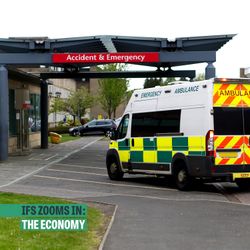
2. Why isn’t the NHS improving faster?
37:44||Season 7, Ep. 2The NHS holds a unique place in British life: a source of national pride, and the single biggest public service in England. This year it’s set to cost over £200 billion, around £3,500 per person, more than we spend on education, defence, justice and transport combined. And yet, despite sustained funding increases and around a quarter of a million more staff than in 2019, concerns about performance haven’t gone away.Labour came into office promising to get a grip on record waiting times, but progress so far looks limited. The waiting list stands at 7.3 million, only slightly down from around 7.6 million when the government took office a year and a half ago. With winter pressures, flu surges, and resident doctors taking strike action, it raises a big question: what’s actually going on inside the system, and is improvement realistically on the horizon?In this episode, Helen is joined by IFS colleagues Olly Harvey-Rich and Max Warner to unpack the data and the trade-offs. We look at winter pressures and capacity, what the latest performance metrics tell us, and the real constraints facing the NHS in England - money, productivity and system design. Finally, we look ahead to the rest of the parliament: should we be hopeful about meaningful change, or are the obstacles bigger than the plans?Become a member: https://ifs.org.uk/individual-membershipFind out more: https://ifs.org.uk/podcasts-explainers-and-calculators/podcasts
1. What really matters for the UK economy in 2026
42:45||Season 7, Ep. 1Moving into 2026, the government faces a critical period of delivery. After 18 months in power and several major fiscal events behind them, the focus is shifting from setting policy to seeing it through. However, with unemployment reaching 5.1% and a series of high-stakes reviews underway, the road ahead remains complex.In this episode, we are joined by Christine Farquharson and Tom Waters to examine the economic landscape for the year ahead. We look at the rising pressures on the public purse, from health-related benefits to the "national conversation" on SEND, and ask what the upcoming fiscal events might reveal about the government’s long-term strategy. We also look at what could shift the outlook, for better or worse, from public sector productivity to the economic impact of new technologies like AI and GLP-1 drugs.Become a member: https://ifs.org.uk/individual-membershipFind out more: https://ifs.org.uk/podcasts-explainers-and-calculators/podcasts
33. Tax changes in the Budget
39:22||Season 6, Ep. 33As ever the big-picture choices in the Budget dominated media coverage - but some of the most interesting changes were buried in the detail. From electric vehicles to tourist tax, how much do these quieter tax shifts really matter?In this episode, we dig into the lesser-noticed policies: why the government is offering upfront EV grants while planning a per-mile tax, how tweaks to salary sacrifice and cash ISAs could shape saving behaviour, and what the changes to EIS and EMI mean for investment and entrepreneurship. Joining Helen are Stuart Adam and Ben Zaranko from the IFS to break down what’s changed, why it matters, and what the “devil in the detail” tells us about the government’s tax strategy.Become a member: https://ifs.org.uk/individual-membershipFind out more: https://ifs.org.uk/podcasts-explainers-and-calculators/podcasts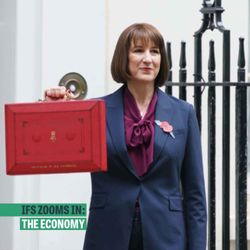
32. The Autumn Budget explained
45:47||Season 6, Ep. 32This week on IFS Zooms In, host Helen Miller is joined by IFS economists Ben Zaranko and Christine Farquharson to unpack one of the biggest Autumn Budgets in years. With seventy-five policy measures, major tax and spending changes, and a striking shift in the economic forecasts, this was a Budget that surprised almost everyone.Helen, Ben and Christine break down:Why the expected “fiscal repair job” never arrivedHow a “lucky” surge in forecast tax receipts reshaped the Chancellor’s optionsThe major spending stories: abolishing the two-child limit, rising welfare pressures, SEND funding reform, and tighter departmental plansThe government’s tax decisions - from threshold freezes to the new ‘mansion tax’Whether any of this adds up to a credible long-term strategy for growthBecome a member: https://ifs.org.uk/individual-membershipFind out more: https://ifs.org.uk/podcasts-explainers-and-calculators/podcasts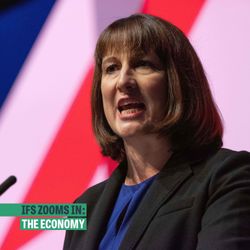
31. How could the Chancellor cut spending?
41:20||Season 6, Ep. 31As the Chancellor prepares her Budget, attention is turning not just to how she could raise more tax - but how she might cut spending. Where does the government actually spend its money? Why is it so difficult to reduce that spending in practice? And what would it take to genuinely pare back the size of the state?Helen Miller is joined by IFS colleagues Ben Zaranko and Tom Waters to unpack the realities behind public spending. They look at how the government’s budget is divided across welfare, public services, and investment; how pressures such as an ageing population, defence commitments and struggling services constrain choices; and whether efficiencies or productivity gains could ever plug the gap.Become a member: https://ifs.org.uk/individual-membershipFind out more: https://ifs.org.uk/podcasts-explainers-and-calculators/podcasts
30. Is the UK in hock to the bond market?
40:15||Season 6, Ep. 30The bond market plays a crucial role in shaping government spending decisions - but how much power does it really have? With a Budget around the corner, are investors or Rachel Reeves setting the limits on fiscal policy?In this episode, we unpack how the government borrows, why it’s so expensive right now, and what “fiscal credibility” really means. Joining Helen are Jack Meaning, Chief Economist at Barclays, and Ben Zaranko, IFS, to discuss the state of the bond market, the lessons from the Liz Truss era, and what investors will be watching for in the 2025 Budget.Become a member: https://ifs.org.uk/individual-membershipFind out more: https://ifs.org.uk/podcasts-explainers-and-calculators/podcasts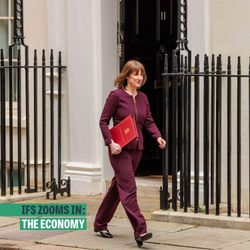
29. How could the Chancellor raise more tax?
52:17||Season 6, Ep. 29As the Chancellor prepares for her next Budget, attention is turning to how more tax revenue could be raised. What options are on the table - and what would they mean for households, businesses and the wider economy?Helen Miller is joined by IFS colleague Stuart Adam and tax expert Dan Neidle to explore the choices facing the Treasury. They discuss options from income tax and frozen thresholds to landlords, partnerships, pensions, and property taxes, asking which levers make sense and which should be left well alone.Recorded live as part of the ESRC Festival of Social Science.Become a member: https://ifs.org.uk/individual-membershipFind out more: https://ifs.org.uk/podcasts-explainers-and-calculators/podcasts
28. How to fix VAT
44:28||Season 6, Ep. 28Why are chocolate-covered shortbread and plain shortbread taxed differently? The UK’s VAT system is full of bizarre inconsistencies that make it complex, inefficient, and unfair.In this episode, we dive into how VAT works, why economists tend to love it in theory, and why the UK’s version falls short in practice. We explore zero and reduced rates, exemptions, myths about regressivity, and discuss how simplifying VAT could make it fairer and less distortionary.In the fourth and final episode of our tax mini-series, Helen, Ben and Stuart look at how to fix one of the UK’s most important and misunderstood taxes.Become a member: https://ifs.org.uk/individual-membershipFind out more: https://ifs.org.uk/podcasts-explainers-and-calculators/podcasts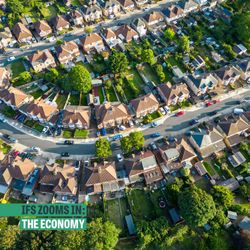
27. How to fix property taxes
49:36||Season 6, Ep. 27From council tax and stamp duty to business rates and taxes on landlords, the UK’s system for taxing property is complicated, inconsistent, and long overdue for reform.Homes aren’t just places to live - they’re also assets and a major form of saving - which makes deciding how to tax them especially tricky. In this episode, Helen is joined by Stuart Adam and Ben Zaranko to explore how property is currently taxed, what’s gone wrong, and how it could be made fairer and more efficient.Become a member: https://ifs.org.uk/individual-membershipFind out more: https://ifs.org.uk/podcasts-explainers-and-calculators/podcasts